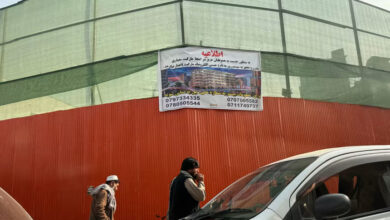Screenwriter and producer Mohamed Hefzy has worked on many award-winning films, including 2005’s “Malaky Iskanderia” (Alexandrian License Plate) for which he won Best Screenwriter in Egypt from the Catholic Festival and 2007’s “45 days,” which received an Egyptian Oscar. Most recently Hefzy produced the film “Microphone,” an independent feature which blends fact and fiction in telling the story of Alexandria’s underground art and music scene.
“Microphone” won the Tanit d'or at 2010’s Carthage Film Festival and, last week, took home the prize for Best Arab Movie at the Cairo International Film Festival. The success of “Microphone” has led Hefzy, who was previously tied mostly to mainstream movies, to diversify his work as a producer between independent and commercial movies.
Hefzy sat with Al-Masry Al-Youm to talk about independent versus mainstream cinema, Egypt's star system, and his new project.
Al-Masry Al-Youm: Before “Microphone,” which had a small budget and limited crew, your name as a screenwriter and producer was mostly linked to mainstream films. How different was this experience compared to the films you produced earlier in your career?
Mohamed Hefzy: The films I produced were still relatively small budget compared to other films on the market. Before “Microphone” I produced four films which, in terms of budget and box-office, were small to medium budget films. But it’s true they were directed at a more mainstream audience. “Microphone” is definitely a departure from that kind of movie, and it was harder for me to do this smaller film, because I had to learn to work within the constraints of independent, low-budget films.
What helped me is that the team working on the movie understood the concept of “independent” and did not have the same expectations of getting paid nearly as much as the industry standards.
Also, I had to learn how to do a film with a very small crew and how to organize logistics with an average of eight people in the crew, not counting the actors. But I think the movie was possible also because of this limited team and the small portable camera which enabled us to be very mobile. Also, people don’t pay attention to you in the streets, so it becomes easier to shoot outdoor scenes. It is also important to create a feeling of intimacy with your actors and it is easier to achieve this when you have a small crew that does not intimidate the actors.
Al-Masry: What made you confident in producing this movie in the first place?
Hefzy: Well, I had to sound confident, but I was actually not sure whether the distributors would go for it because they had not read the script, so I just told them that it was a film about youth and about music and that I believed in it.
I think they had enough trust in me because of the previous work we had done together to give us the financial backing and guarantee the film’s distribution. Now the Egyptian part is taken care of in terms of distribution, but internationally Khaled Abu el Naga, the co-producer, and I are still trying to push it out into the market.
Al-Masry: What did you hope to show with this film?
Hefzy: We wanted to showcase these talents and show that they somehow represent a new voice in our culture. There is a certain need for evolution and expression against the mainstream frame of our social system, whether it is political or artistic. We felt that they were talented enough that if they were put out there people would respond to their music and art.
From the reactions at the few screenings at festivals and the screening in Egypt there seems to be some response.
But I also have to underline that we were financed by one of the biggest distributors in Egypt, so we have not produced a totally independent film. It’s not a film done outside of the system from a financial point of view, only in the way it was produced.
Al-Masry: Do you consider yourself to be a dissident producer?
Hefzy: Yes, in a friendly way. I was not doing it against the will of everybody else; it was a leap of faith that I had to take. But the cost is so small compared to the kind of movies others make that there was not much at stake.
Al-Masry: You are in the process of producing a movie about an HIV patient, so it seems to me that you are tackling pretty taboo issues, ones that represent a shift in your focus.
Hefzy: Absolutely, but then again I am still doing mainstream films, like the comedy I produced just a few months ago, “Sameer oua Shaheer oua Baheer,” (Sameer and Shaheer and Baheer) which was a success even though the cast was unknown. So it’s not purely a shift as much as it is a diversification.
I realize it’s difficult to do a film that is going to win a lot of awards and make money at the same time. It’s easier to produce a film that is going to be a commercial success and another one that is going to be positively received by the critics.
Al-Masry: Could you explain the plot of the film “Asmae"?
Hefzy: It is based on a true story and was initially produced with the support of the United Nations Aids Program in Egypt. Hind Sabry, who has not done a film for over two and half years now, is the lead actress and she plays the part of a woman who has HIV.
It is a film about the perception and the fear of the disease and the isolation a seropositive person experiences from society. But it is not only a film about HIV, it is a film about exclusion and overcoming the fear to be able to face up to it and confront society with whatever is keeping you from living a normal life. I do believe very much in the writer and the director, Amr Salama, with whom I worked before on “Zay al-Naharda” (On a Day Like This) and I think he is taking a big step with this film by tackling a more daring subject.
Al-Masry: Do you have the feeling that the Egyptian cinema is evolving towards a less star-driven market to the benefit of fresh blood and new actors?
Hefzy: I think the stars still pretty much control a big percentage of the market, but producers and distributors now have a really strong will to change that. Some of the biggest failures of the past few years had big stars in them.
There is a danger of these films becoming extinct because half of the budget is allocated to the star, leaving very little money for the quality of the production. There is also a desire for young, new talents, for example the movie “Sameer oua Shaheer oua Baheer” had unknown actors and still became a huge commercial success.
There is a chance to pull out a new generation of talents and stars but you have to make very good films to be able to launch them. Because if you don’t, people are going to watch the stars even if they make bad films. Unless you make a great film, well-distributed and well-marketed, then it’s impossible to compete with bigger films.
I think anything fresh and new, if it’s good, people want it.




